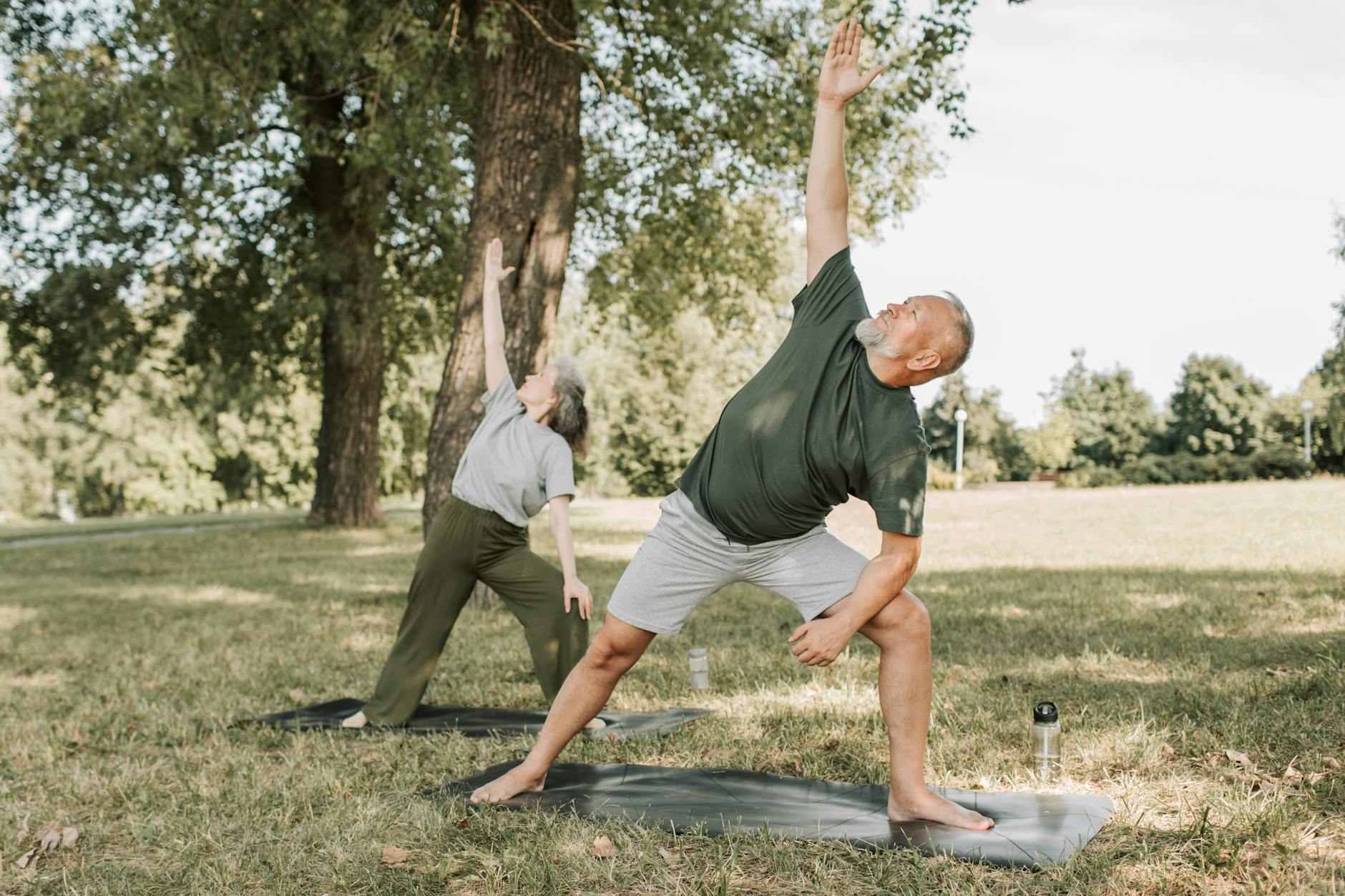Health and Wellness in the Golden Years (60+)

🧠 Mental Health
Common Challenges
- Depression and Anxiety: Around 14% of adults over 60 experience mental disorders such as depression and anxiety (WHO, 2023).
- Cognitive Decline: Memory lapses, mild cognitive impairment, and dementia are increasingly common.
Impact on Life
- Reduced independence and daily functioning.
- Strained relationships with family and friends.
Strategies
- Engage in puzzles, reading, or learning new skills.
- Maintain social interactions to combat loneliness.
- Seek professional counseling or therapy if needed.
💪 Physical Health
Common Challenges
- Chronic Conditions: Hypertension, diabetes, arthritis, and heart disease are prevalent (NCOA, 2023).
- Mobility Limitations: Reduced muscle mass and bone density increase fall risk.
Impact
- Limitations in performing daily tasks independently.
- Increased healthcare costs and financial strain.
Strategies
- Walking, swimming, yoga, or low-impact aerobics.
- Balanced diet rich in fruits, vegetables, lean protein, and whole grains.
- Regular medical check-ups and screenings
Emotional Well-being
Common Challenges
- Loss of loved ones leading to grief and emotional distress
- Changes in identity and purpose after retirement.
Impact
- Unaddressed emotional issues can lead to depression or anxiety.
- Emotional struggles affect family and social relationships.
Strategies
- Mindfulness, meditation, or deep breathing exercises.
- Pursue hobbies and creative outlets.
- Engage in therapy or counseling when needed.
Sleep & Rest
Common Challenges
- Insomnia
- Frequent waking
- Lighter sleep cycles.
Impact
- Cognitive decline, memory problems, and increased fall risk.
- Fatigue affects daily functioning and emotional well-being.
Strategies
- Maintain a consistent sleep schedule.
- Reduce caffeine/alcohol before bedtime.
- Calm bedtime routines; consult a sleep specialist if needed.
Nutritional Health
Common Challenges
- Reduced appetite or taste changes.
- Digestive issues like constipation or slower digestion.
Impact
- Weight loss or gain.
- Weakened immunity and exacerbation of chronic illnesses.
Strategies
- Nutrient-dense meals (fruits, vegetables, lean proteins, whole grains).
- Adequate hydration.
- Meal planning with dietary needs in mind.
Social Engagement
Common Challenges
- Social isolation due to living alone or transportation barriers.
- Limited community involvement opportunities.
Impact
- Increased risk of cognitive decline and depression.
- Physical and emotional health decline.
Strategies
- Join local community centers or clubs.
- Volunteer or mentor to maintain purpose.
- Use technology to stay connected with family and friends
Financial Health
Common Challenges
- Living on a fixed retirement income.
- Rising healthcare expenses.
Impact
- Financial stress impacts mental and emotional well-being.
- Dependence on family or social services
Strategies
- Budgeting and financial planning.
Insurance coverage and retirement fund management. - Legal documents such as wills and healthcare directives.
Caregiver Support
Common Challenges
- Physical and emotional strain on caregivers.
- Financial burden due to caregiving responsibilities.
Impact
- Neglect of caregiver health.
- Social isolation for caregivers.
Strategies
- Respite care to take breaks.
- Join support groups for shared experiences.
- Seek professional assistance when needed.

Ways TransformationWithin Can Help
🧠 Cognitive Stimulation & Lifelong Learning
- Memory exercises, brain games & new skill-building courses to keep the mind sharp
- Flexible on-demand learning tailored to your energy levels & schedule
💪 Guided Physical Fitness Programs
- Low-impact exercise, yoga, strength & balance training video modules
- Supports mobility, fall prevention & heart health — all from home
💖 Emotional & Mental Wellness Support
- Courses on mindfulness, stress relief, and emotional resilience
- Coping strategies for grief, anxiety & depression in later life
🥗 Nutrition & Healthy Eating Guidance
- On-demand meal planning & nutritional tutorials for older adults
- Includes chronic disease management support through diet & hydration
👥 Social Connection & Community Building
- Encourages meaningful global connections with peers & groups
- Reduces isolation and builds a sense of belonging
💰 Financial Literacy & Planning Courses
- Modules on budgeting, managing expenses & long-term financial security
- Helps reduce financial stress & maintain independence
🏡 Home Safety & Independent Living Tutorials
- Practical guides for home safety, accessibility & mobility
- Includes emergency preparedness & fall prevention tips
🧘 Stress Management & Mindfulness Workshops
- On-demand breathing & relaxation techniques
- Improves sleep, clarity & emotional balance
💻 Digital Literacy & Technology Skills
- Training on smartphones, video calls & messaging
- Empowers older adults to stay connected, independent & engaged
⚕️ Preventive Health & Wellness Education
- Courses on vaccinations, screenings & chronic condition management
- Equips older adults to take control of their health & reduce caregiver reliance
TransformationWithin empowers older adults with knowledge, confidence, and tools to live healthier, more connected, and purposeful lives.
Intimacy in the Golden Years (60+)
What Does Intimacy Mean Here?
In later life, intimacy often becomes gentler, deeper, and more soulful. With fewer outside demands and more time together, closeness shifts toward
- Companionship
- Shared memories
- Mutual care
In simple terms, intimacy in the golden years is about being truly present and finding peace in togetherness.
The Many Forms of Intimacy
Psychologists highlight that intimacy in the golden years takes many shapes:
- Emotional intimacy — Feeling understood, valued, and supported, even in silence.
- Mental intimacy — Sharing conversations, storytelling, or reflecting on life together.
- Physical intimacy — Gentle touch, holding hands, or small gestures that nurture closeness.
- Relational intimacy — Bonds built on years of trust, forgiveness, and loyalty.
Intimacy & Romance in Later Life
Redefining Romance in the Golden Years
Romance after 60 often looks quieter but more meaningful. It’s not about grand gestures—it’s about:
💌 Acts of kindness that whisper, “I still choose you.”
🚶 Evening walks hand-in-hand
☕ Shared morning tea
✨ Small surprises
Why Intimacy Matters: Intimacy provides:
🛡️ Emotional safety — a secure bond where you can be fully yourself.
🤝 Deep companionship — someone who truly “gets you.”
🌹 Lasting love — a connection that sustains joy and wellbeing.
What Science Says
Studies show that older couples who nurture intimacy experience:
🧠 Mental clarity — Strong bonds lower depression, anxiety, and even the risk of cognitive decline.
💖 Emotional peace — Being understood and cherished increases happiness and life satisfaction.
💪 Physical health — Supportive intimate relationships reduce chronic illness risks and improve recovery.
🌳 Relational legacy — Deep intimacy nurtures patience, forgiveness, and gratitude, enriching family ties for generations.
In later life, intimacy isn’t fading—it’s deepening. It becomes the foundation of joy, resilience, and legacy.
In this stage, intimacy is often less about physical expression and more about deep companionship, shared memories, and unconditional love.
🧠 Psychological:
Older adults in unsatisfying or intimacy-poor marriages are more likely to experience depression and cognitive decline (PMC8897809).
💞 Emotional:
Surveys of adults over 60 show that those lacking intimacy report lower life satisfaction and higher loneliness, even when surrounded by family (NCOA, 2023).
🤝 Relational:
Research suggests that couples who lose intimacy later in life often experience withdrawal and lack of companionship, with long-term effects on quality of life (PubMed ID: 31070402).
❤️ Physical:
Lack of supportive intimacy in later years is linked to higher mortality risk, slower recovery from illness, and poorer cardiovascular outcomes (Health Psychology, APA, 2014).
Preventive Health Measures
Importance
- Early detection of conditions.
- Health maintenance and disease prevention.
Actions
- Regular screenings (diabetes, cancer, heart disease).
- Up-to-date vaccinations.
- Healthy lifestyle: diet, exercise, stress management.
Environment & Safety
Common Challenges
- Home hazards increase the risk of falls.
- Lack of accessibility or adaptive living features.
Impact
- Reduced independence and increased accidents.
Increased dependence on family or caregivers.
Strategies
- Home modifications: grab bars, ramps, and proper lighting.
- Emergency preparedness: contact lists, alert devices.
- Consider senior-friendly communities for enhanced support.
Spiritual & Purposeful Living
Common Challenges
- Loss of purpose after retirement or loss of loved ones.
Impact
- Depression, anxiety, and social withdrawal.
Strategies
- Engage in meditation, prayer, or spiritual practices.
- Volunteer, mentor, or engage in meaningful activities.
- Lifelong learning to maintain cognitive and emotional engagement.
💻 Technology & Digital Literacy
Common Challenges
- Discomfort or lack of knowledge in using modern technology.
Impact
- Limited access to telemedicine, online banking, or social interaction.
Strategies
- Technology training courses.
- Use video calls, social media, or digital apps for connection.
- Online learning and entertainment for mental stimulation.
Stress Management & Resilience
Common Challenges
- Chronic stress from health issues, finances, or caregiving.
Impact
- Accelerates aging, worsens chronic conditions, and affects mental health.
Strategies
- Mindfulness, meditation, yoga, or journaling.
- Pursue enjoyable hobbies.
- Seek professional help when overwhelmed.
Infectious Disease Prevention
Common Challenges
- Older adults are more vulnerable to infections like flu, pneumonia, or COVID-19.
Impact
- Increased risk of severe illness and hospitalization
Strategies
- Stay current with vaccinations.
- Practice good hygiene (handwashing, sanitizers).
- Avoid crowded or high-risk environments during outbreaks.
Lifelong Learning & Engagement
Common Challenges
- Retirement may reduce mental stimulation and social interaction.
Impact
- Cognitive decline and decreased sense of purpose.
Strategies
- Take classes, join workshops, or participate in discussion groups.
- Learn new hobbies or skills.
- Engage in community projects or mentorship roles.
Key Takeaways for a Healthy Golden Years Lifestyle
Living well after 60 isn’t just about longevity — it’s about quality of life, purpose, and balance. These pillars support mind, body, and spirit:
🧠 Mental Stimulation
- Engage in puzzles, reading, and lifelong learning.
- Keep the brain active with new skills and challenges.
💪 Physical Activity
- Prioritize strength, balance, and gentle cardio.
- Aim for safe, low-impact movement to stay independent.
💖 Emotional Wellness
- Nurture mental health through therapy, mindfulness, and joyful hobbies.
- Focus on self-compassion and meaningful connections.
💤 Sleep
- Maintain a consistent sleep routine.
- Practice good sleep hygiene to boost energy, memory, and mood.
🥗 Nutrition
- Choose nutrient-dense meals and hydrate daily.
- Plan meals that support immunity, bone strength, and energy.
👥 Social Engagement
- Stay connected with friends and family.
- Volunteer, join community groups, or explore new social circles.
💰 Financial Planning
- Practice smart budgeting and future-proof with insurance.
- Keep legal and health documents up to date for peace of mind.
🛡️ Safety
- Adapt the home for mobility and safety.
- Prepare for emergencies with clear plans and easy access to help.
🌿 Spirituality & Purpose
- Explore meditation, gratitude, or prayer practices.
- Share wisdom through volunteering, mentorship, or storytelling.
💻 Technology
- Learn digital skills for communication and independence.
- Use online tools for health, learning, and connection.
🧘 Stress Management
- Incorporate mindfulness, breathing exercises, or relaxing hobbies.
- Seek professional support when needed.
Preventive Health
- Stay up to date with screenings and vaccinations.
- Build healthy routines that reduce risks of chronic illness.
The golden years can shine when mental, physical, emotional, financial, and spiritual health work together in harmony.
Our Programmes
Our coaches provide comprehensive interventional support for students through both group and individual program options.
Get In Touch
Reach out to learn more about how we can help, or if you have any questions or concerns
